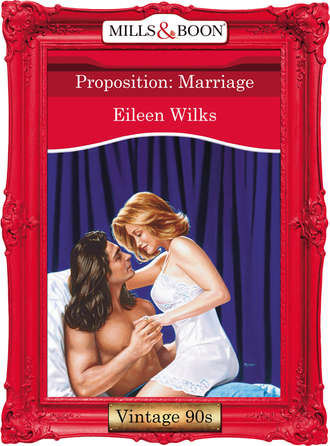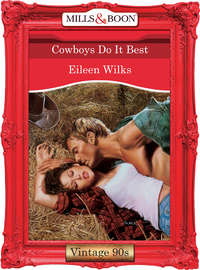
Полная версия
Proposition: Marriage
His gaze met hers. His lips smiled, but those vastly blue eyes of his were cold. He brought his mouth close again m that disconcerting simulation of a lover’s approach, so that his voice was a puff of barely heard words on her skin. “Me. So if you’re tired of my company, sweet Jane, all you have to do is attract their attention.”
The authorities were after him? She jerked—not much; just one quick, involuntary motion away from a man who might be the criminal she didn’t believe him to be.
A pebble rolled down the hill.
She froze in horror.
At first she thought it would be all right. Then one of the men said something, pointing in their direction. A couple of them stopped and peered upward. One chided the others for being jumpy, and the first man defended himself angrily. A fourth man—maybe he was a sergeant or an officer; he had a cleaner uniform—came back to see what the argument was about.
The man beside her stiffened. She turned her head slowly.
He wasn’t looking at her. Or at the federales. A bead of sweat trickled slowly down his temple as he stared at his left hand, the one farthest from her.
A snake slithered slowly across his outspread hand.
It paused, a pretty creature a little more than a foot long, the green, scaly body crossed by narrow white bands. It looked like a chubby green rope. Jane tried telling herself that short, chubby snakes weren’t as scary as long, sleek ones, but fear sucked her brain empty, and the thought wouldn’t stick.
The snake raised its flat, lance-shaped head, opened its mouth and tasted the air with rapid flicks of its tongue.
Only inches separated the snake’s mouth from John’s face.
Panic crawled over her like a swarm of ants. She wanted to move—wanted it with a twitchy physical craving she’d never known before—but if she moved, if she even breathed too hard, the snake might bite John. She had managed to stay still with that bug on her. She could do this. She had to, or it would bite him and he would die. Right there beside her he would die, and it would be all her fault.
She told herself desperately that most snakes weren’t venomous. John was holding very, very still, so maybe he didn’t know this. She wasn’t sure he was even breathing.
The snake lowered its head and moved forward. Over John’s hand. Across the ground. And straight toward Jane’s hand.
She thought she’d faint.
It sampled the air near her clenched fist. When had she closed her fingers up tight like that? Now she couldn’t relax them. She thought furiously “vegetable” thoughts at the snake: I am a green, leafy plant. I am warm from the sun, not from blood. You can’t eat me. I am a green, leafy plant....
The snake’s tongue flicked over her skin. She stopped breathing. Her vision dimmed.
But she didn’t move.
The snake turned away from her hand and slithered casually on into the thicket.
She watched as it slid through the grass, heading slowly downhill. Her chest hurt. She remembered to breathe, which helped. She wondered if the snake would go all the way down to the gully and bite one of the soldiers.
The second the snake vanished from sight, she felt a hand on hers.
This time, she didn’t jump. She turned her head.
John nodded once. What is that supposed to mean? she wondered hysterically. Hello? How are you today? Seen any good snakes lately? Then he started inching backward on his stomach. Alarmed, she glanced down and saw that while they’d been occupied—literally—by the snake, the soldiers had moved along the gully and out of sight.
She was more than ready to follow her rescuer’s lead this time.
They inched backward until they could stand. As soon as she was on her feet he took her hand again.
They ran hand in hand down one of the trails, him ahead, her behind, and no doubt he was fully in control of himself and had sound, logical reasons for making such a speedy escape. Jane ran because it felt so damned good to run. She didn’t want to stop. She didn’t want to see another bug or soldier or slithery green snake ever again--or any part of a forest, either. But the forest was all around them, and no matter how hard they ran, she couldn’t get away from it.
He slowed and stopped, pulling her off the trail with him into a small, sun-dappled spot, a patch of ground where some mystery of the soil had caused the trees and underbrush to thin. There was enough sunlight for a bit of grass to spread itself out. Scraps of blue showed through overhead, laced by the leaves of the few branches that arced above the pocketsize clearing.
“I’m not tired,” Jane said, gasping for breath and clutching her side. “I can keep going.”
“Hey.” He turned her to face him. “It’s all right. We’re far enough away from them now.” He took her other hand in his, too, and smiled at her.
“I—I—” She couldn’t catch her breath. He wasn’t winded, damn him, and his ponytail was still neat. “I hate snakes!” she exclaimed. “I hate snakes, I really do. I just hate them, but I couldn’t move. At first it would have bit you and then it would have bit me, but I—I—” Her breath caught in a hiccup that was perilously close to a sob.
“I know,” he said, and pulled her up against him and put his arms around her. “You hate snakes.”
He was warm and solid and she clutched at him, delirious from lack of oxygen. “I know you’re not laughing at me,” she told him. “Because if you were, I’d have to kill you, and I don’t have my breath back yet.”
“I’m not laughing,” he assured her, and his hand stroked down her back. “You did good back there. Real good. I thought I was dead. I would have been, if you’d startled the snake. You saved my life by keeping your head.”
She had rescued him? The thought made her even more dizzy. “Then it was poisonous? I thought maybe you were just scared of snakes, too.”
“I think it was a fer-de-lance. They’re rare, and I’ve never seen one in person before, so I could be wrong. It could have been another of the bothrops—that’s a genus of pit viper found in Central and South America.”
She pulled away suspiciously. “You know an awful lot about snakes. Are you some kind of—of herpetologist or something?”
“I thought we’d agreed that I was a spy.” His expression was solemn, but his eyes were bright with mirth.
“You are laughing at me.”
“You sounded so horrified.” he said apologetically.
“Well, spying I could understand, but why anyone would want to spend their life studying snakes—”
He chuckled.
She blinked and managed to be offended for one whole second before her own absurdity tricked her into giggling. “I r-really don’t like snakes,” she said between giggles, and this struck her as so exquisitely funny that she went off into peals of laughter—at herself, at him, at the whole silly show of life, because she was so very glad she was still a part of it.
He didn’t laugh. His eyes changed, darkening, but that was the only notice she had. It wasn’t enough of a warning, not when she was laughing so hard her vision was blurred by tears.
When his mouth closed over hers, her laughter stopped.
His lips were smooth and firm and beguiling, and she smelled him—oh, she breathed him right in, and he went to her head like wine. She made one sound of protest, but he ignored that, just as he ignored the hand she put on his chest to hold him back. He simply moved her hand out of his way while his other hand slipped to her bottom and scooped her up against him.
It was too much, too fast. She’d lurched from terror to flight, skidded from flight into laughter, and now she was being ruthlessly kissed by a man who made her knees silly and her soul shiver. In a day already ripped loose from everything Jane knew about herself and her world, the sudden surge of passion caught her and flung her into a mad riptide she had no way of resisting.
When he pushed his thigh between her legs and pressed up, she heard herself moan. And it was her. She was the one making those soft, urgent sounds. She had to stop this, stop him—only he pressed up again with his thigh, and his tongue wet her lips while his hands, both hands now, kneaded her bottom, lifting her, then pressing her down on the leg she straddled. He taught her to ride him, taught her a slow, rolling rhythm that carried her mind the rest of the way out to sea, and left her body in charge.
And her body knew what it wanted.
He pulled her down with him. The forest floor was damp and spongy, and the moist, fecund odor was almost as intoxicating as the way he smelled when she pressed her face to his neck.
He didn’t unfasten her clothing. He ran his hands over her as if there was no part of her he didn’t need to feel, to know. Her knee, her breast, her shoulder. The soft swell of her belly But he didn’t take her clothes off, which gave her a spurious sense of safety.
Then his mouth left hers and closed over the tip of her breast. Right through her dress and her bra he suckled her, and no one had ever done that to her. She hadn’t even known people did that—not with their clothes on—and she was almost shocked back into conscious thought. Almost. But by then he had her dress and her bra wet from his mouth, and he did things with his tongue and his teeth that rasped the dampened material against her sensitive nipple, and she moaned instead, and clutched at his shoulders.
His mouth moved to her other breast, and that was good, too; that was what she wanted. He sucked. She felt his hand on her leg, and it was drawing her skirt up, and that felt good, too—the warmth of his palm on her thigh, on her—
She yelped when he pressed his palm against her there, right between her legs. He slid a finger beneath the elastic of her panties and touched her even more intimately, and she moaned again, and this time she shocked herself, because her hips lifted pleadingly.
“I—I—” she stammered. “I don’t—ah—”
He licked her nipple. His finger slid inside her feminine folds and rubbed her lightly. She made a sound she’d never made before, and her hips turned wanton again, making that greedy pushing-at-him movement. But she held on to the thin thread of consciousness and gripped his shoulders hard, willing him to look at her.
He raised his head. His mouth was wet and his eyes gleamed with hunger, and his finger was still moving, stirring her unbearably. He looked so entirely delicious she knew this was her last chance “I don’t do this sort of thing!” she gasped.
“But I do, Jane,” he said gently, and he moved his hand, stretching the elastic of her panties so that his finger went up inside her. “I do.”
And he did, too. First he kissed her again. And he tasted like danger, but he also felt like safety and home—solid and strong and eager for her, so eager. Maybe she could have fought her own hunger, the need that had grown in her all day. She couldn’t resist his.
He wasn’t cold now. Now he burned just as she did. Now he needed her.
And when he pulled her panties down and shifted between her legs, she helped him. He gripped her hips in his hands and guided himself inside, and the sensation was so rich and huge it almost sent her over the top right then.
Her eyes closed. She slipped her hands inside his loosened shirt, and delighted in his skin. “John,” she gasped. “John.”
He didn’t move He was fully, firmly inside her, but he wasn’t doing anything. Jane wasn’t exactly a woman of the world, but she knew what was supposed to be happening now, and it wasn’t.
She opened her eyes and looked up at him.
His eyes were full of all sorts of blue—the restless blues of oceans and ghosts and sorrow, and the hot blue at the heart of a flame. “My name isn’t John,” he said softly. Then, at last, he began to move.
She was warm and limp beneath him. Instinct or some last gasp of reason had kept him braced on his elbows so that now, as he slowly seeped back into himself after the sensory explosion of climax, his upper body, at least, wasn’t crushing her.
Unlike her, he was still fully dressed. But he felt naked. Trapped and naked and exposed.
Fear was a swell he rode, a great, ocean-deep wave too vast and familiar for panic. Reason rode the wave with him—a slim craft he clung to. But reason told him he had just made himself into a fool. Fools died quickly in his business. And sometimes they caused other people to lose their lives, too.
He looked at the woman beneath him. Her eyes were closed. A half smile curved her lips. Sweat dampened her face and shoulders, making her glow. The little chain she wore around her neck hung crooked now. The locket dangled in the dust beside her.
Ah, Jane.
He pushed off her. “Get up.” Grimly he put himself to rights and zipped his pants.
She blinked up at him, obviously confused, a trickle of hurt altering the curve of her mouth. He had to force his voice to soften, but it took no effort at all to reach out one more time and cup her cheek; her skin was so soft. “I’m sorry,” he said more gently. “I’ve endangered both of us. We have to get out of here, quickly.”
His shirt hung outside his pants. It was partly unbuttoned. He remembered her hands—such warm, avid hands—struggling to undo a few buttons so she could stroke his chest
She did sit up, but then just sat there, looking bewildered. The skirt of her dress slipped from her waist to puddle in her lap. Her bodice was still damp over one nipple. “You didn’t put us in danger,” she said. “There’s no one around.”
She didn’t understand. He’d forgotten everything but the need to bury himself in her. That went beyond danger to sheer foolhardiness. How could he have lost control so completely?
He’d been doing all right until she’d laughed.
He tightened his lips. “The federales we saw were looking for me. They intend to shoot me, Jane, not take me prisoner.”
“But why?”
He hesitated, but there was no reason not to tell her this much. “I have information some people don’t want leaving the country, and those people have enough money to bribe any number of government officials. If you’re with me when they find me, they’ll kill you, too. I have to get you to the village so I can get the hell off this island.” He didn’t want to die on his last assignment. He didn’t want to see this bright, plucky woman shot down because she was with him.
She bit her lip, her eyes wide with fear. Slowly, she stood. “Who are you?” she whispered. “What are you?”
He met her gaze, and wondered if the sadness he felt showed. “Who and what I am doesn’t matter at all. You can forget me under the name ‘John’ as well as you could under another name.”
“I’m not going to—”
“You will. You have to.”
Three hours later, Jane sat on a cot in a rapidly-darkening room in a village whose name she still hadn’t heard. Her host, a British expatriot, was in the parlor of the small but pleasant house, talking secrets with the man whose name wasn’t John.
He had to leave her here, she knew. He couldn’t stay and be found by the government troops quartering the area for him. She knew he had to leave and she knew she would never see him again, but she sat there and waited for him to at least come and say goodbye.
He never did.
Four
It was not yet dark, but the light was fading as dusk slowly replaced daylight In an old frame house on a street lined with elms, a light came on in an upstairs window. Most people in town still referred to the old house as “the MacAllister place,” though all but one of that family had died or moved away years ago. The one remaining MacAllister, Frances Ann, lived downstairs with her cats, her needlepoint and her family albums.
Jane lived upstairs.
She flipped on the light switch in her kitchen and hurried to the pantry. She pushed aside the gingersnaps, the rice and two boxes of breakfast cereal, muttering under her breath. She was due at the meeting of the Atherton Combined Charities in fifteen minutes. As secretary for the community-wide fund-raising project, she absolutely had to be there. But she was not leaving without her crackers.
She probably wouldn’t be late, she told herself as she switched her search to the second shelf. Even if she had to stop and buy more crackers, she had time. She could get from anywhere in Atherton to anywhere else in fifteen minutes, usually with time to spare. But she didn’t want to get into her car without crackers. Although she seemed to be over the stomach bug that had afflicted her off and on for the past two weeks, she wasn’t taking any chances. The nausea might come back when she started driving.
Ah. She straightened as her hands touched a cellophane-wrapped package. Success.
Jane grabbed her purse, shrugged it onto her shoulder and flipped on her porch light. It would be dark by the time she came home. She stepped out onto the landing and was just pulling her front door closed when the phone rang. She froze.
Her hand went to her chest. She could barely feel the lump her locket made beneath the wool of her favorite pink sweater. Her fingers pressed against that tiny lump. Don’t be silly, she scolded herself. It was probably her mother, calling to check on her. Marilee Smith’s normal fretfulness had escalated to nearly unbearable levels since Jane had returned from the island.
She really ought to go back inside and reassure her mother, but—
The phone rang again.
But what if it was him?
It wasn’t, of course. She knew that He’d had three weeks to call if he were going to. He hadn’t. And why should he? What had happened between them had meant nothing to him, obviously. He hadn’t bothered to say goodbye.
She didn’t even know if he was still alive.
No, whoever was calling now, it certainly wasn’t the man who’d been her lover for fifteen life-changing minutes. And dammit, she wasn’t going to do this to herself anymore. She’d stopped crying, hadn’t she?
The tears that had come at odd, unpredictable moments for the first week after she’d arrived home had embarrassed her as much as they had worried her mother. Trauma could have odd effects on a person, but she was done with that. She had nothing to cry about. Nor did she intend to spend any more nights staring at her ceiling with her mind racing like a hamster running itself crazy on its wheel. She would never know if her mysterious rescuer had lived to leave the island or not, and staying awake worrying about him was as pointless as it was pathetic.
But Jane couldn’t silence the frantic little voice inside that said that this time the call might be from him. What if it was?
The phone rang again.
She rubbed the small lump that her locket made. Papa, she thought wistfully, did you ever wonder if some of the chances you took might not have been worth what you risked? Or am I just a coward? Probably she was a coward. Hadn’t she proved how poor she was at coping with danger? Look at what she’d done—made passionate love with a man whose name she didn’t know. Passionate, unprotected love.
Slowly, Jane pulled the door closed behind her. This wasn’t the first call she had refused to answer since she’d gotten home—just in case.
The wind was picking up. It ruffled her hair as she stood on the landing looking down at her reliable old Toyota. She took a steadying breath and promised herself that tomorrow she would buy a Caller ID machine so she wouldn’t freak out every time her phone rang.
She pulled a cracker from the package she carried and nibbled on it as she started down the steps.
Samuel Charmaneaux pulled off into the rest area at the top of a low hill. He sat in the three-year-old black Jeep Cherokee he’d bought last week, though the registration showed he’d bought it new. The name on that registration matched the one on his driver’s license, birth certificate and all the other papers that made a person real in today’s world.
He turned off the stereo and rolled down the window, wanting to listen to the wind that blew here. To taste it.
Samuel had been planning this for months. Oh, not all of it. He’d had to wait on circumstances to supply some details. Certainly the particular detail that had brought him nearly fifteen hundred miles across the country hadn’t been part of his original plan, but Samuel’s plans were always fluid. Objectives were the fixed points in his universe, and he was very good at achieving his objectives.
Good, but not perfect. His eyes darkened as he remembered the sound of Jack choking on his own blood as he’d fought for breath. Samuel had been far less than perfect that day. He didn’t exactly blame himself for his friend’s death, but he accepted the burden of it, knowing he’d been part of the events that had led to it. With that acceptance had come a certainty: he could no longer be part of the world he’d lived in for the past ten years.
At first, he hadn’t known what he would do instead. He still wasn’t sure, but he knew what his new objective was. Samuel wanted to be part of the world that other people knew. The ordinary world.
It wasn’t going to be easy. The official records of his new identity would hold up under much stronger scrutiny than he should ever receive, but he wasn’t as sure of himself as he was of his papers. He was used to living under other names, living bits and pieces of borrowed lives, but this was different. This time it would be for the rest of his life. And for the first time in years, “the rest of his life” meant more than just the next job.
Having a future was going to take some getting used to.
To the west, the sun still shone at the rim of the world, but twilight was seeping up from its eastern edge, blurring the outlines of things. Samuel looked down at the small town of Atherton, where lights were blinking on in houses as dusk drew near.
He hadn’t expected hills.
Admittedly, these hills weren’t much. Compared to their grander cousins in other parts of the world, such as the tumbled hills of Provence or the worn heights crowding the ancient city of Dharmsala, these were barely lumps. But the fact that he’d had expectations that weren’t grounded in experience or research bothered him. He was a thorough man. He’d gotten a background check on the town as well as the woman, yet apparently he’d allowed his thinking to be colored by ideas formed about Kansas when he was very young. He’d expected pancake-flat land—not this green, gently rolling country laced with streams.
He shook his head, disgusted. Had he expected to meet a young girl and her little dog, Toto, too?
It had been a long drive, and Samuel’s left palm ached in spite of the care he’d taken with it. He rested his hand on his thigh and began rhythmically opening and closing the hand. The exercise made it hurt more, of course, but the pain was easy enough to ignore. What he couldn’t ignore was the impairment. His fingers still wouldn’t close tightly.
It’s been less than two weeks since the surgery, he reminded himself. He refused to believe he wouldn’t regain any more function than this.
Thunder rumbled off to the west. It was early April, and spring meant storms in this part of the world. His gaze returned to the town at the foot of the hill, and he thought about the future and his plans.
Jane Smith was down there. Jane Desirée Smith, he thought, smiling as he remembered the report he’d read, which had given her full name. Her middle name suited her. On the surface, she was wonderfully ordinary, but there were surprises inside. He thought about pretty Jane of the innocent eyes and delicious body, practical Jane who had climaxed with such amazement Jane, who hated snakes and rescued beetles and kept walking without complaint while her feet bled into her lacy socks.
What was she doing right now? Was she with her family? Was she laughing or sad or worried?
Had she thought about him today?
Determination clenched inside him. She would think of him soon. And soon, he would have an answer to the question that would determine the shape of his future.
The sudden, hot pain startled him. He looked at his hands. He was holding the steering wheel tightly; his knuckles were white. The left hand hurt fiercely, as if struggling to obey, but would not close fully.







